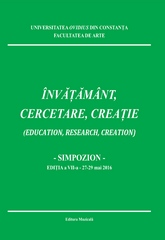Winter on the Steppes: Tristia 2.187-20; 3.10.7-16 & 58-60; 3.12.1-2
Winter on the Steppes: Tristia 2.187-20; 3.10.7-16 & 58-60; 3.12.1-2
Author(s): Barney McCullaghSubject(s): Language and Literature Studies
Published by: Editura Muzicală
Keywords: Tomis; text; emendation; nomads; Dobrogea; Tristia; Ovid; subtextual; winter; milk; Golden Age; life; Rome; exile; Tanaitis; Tyrogetae; metapoetic
Summary/Abstract: We begin with the premise that the text of Ovid’s Tristia is much more corruptthan has been imagined. To support our thesis we discuss Tristia 3.10.7-16, the passage inwhich Ovid describes the arrival of winter in Dobrogea. Hand in hand with our argumentsfor textual change we also discuss the literary merits of the emendations. This will take usinto the territory of Ovid’s overall poetic strategy in his exile poetry.We begin by calling into doubt received assumptions regarding Ovid’s arrival inDobrogea and the weather that greeted him. As our argument proceeds we analyse Ovid’sgeographical position viz-a-viz the northern polestar, as well as the effects of the winter windon the populations of Dobrogea (including secondary effects produced by the freezing of theDanube).In replacing ‘opes’ with ‘oves’ at Tr. 3.10.58, we re-establish the importance of sheepas the basis of the wealth of settled farmers. This leads us on to a consideration of thelifestyle of the nomads whose shadowy presence in the poetry is re-asserted through the word‘patulae’ (Tr.3.10.12). By comparing passages of Strabo relating to the Desert of the Getae,we demonstrate how the names of four nomadic tribes had become corrupted at Tristia 2.191.After a discussion of Ovid’s portrayal of snowfall, we question the famous assumptionthat snow could remain on the ground for up to two winters. This will lead us into adiscussion of Tr. 3.12.1-2 where the emendation ‘Tanaitis’ will be the catalyst for anexploration of themes as diverse as creative etymologies, the Golden Age, the orthography ofLatin under Augustus, and the Roman calendar in January. This will bring the focus of ourwork back to the nomads and their role as a touchstone of the true Golden Age.Our overall aims are to provoke interest in the profundity of Ovid’s text and themanifold interpretations that can be extracted from within the compass of, very often, a singlecouplet.
Journal: Învăţământ, Cercetare, Creaţie
- Issue Year: II/2016
- Issue No: 1
- Page Range: 48-67
- Page Count: 20
- Language: English

